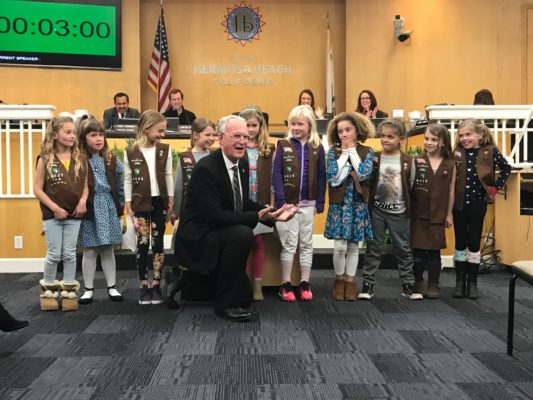Environment is quality of life, not political issue mayor Dulos says

Duclos at a City Council Meeting earlier this year with Brownie Troop 6025. He brought back the young scouts for his State of the City. Photo by Christine Shultz
As he neared the end of his State of the City address last week, Mayor Jeff Duclos paused like a man who had reached the top of a hill, only to have a mountain reveal itself from the new vantage.
“So the question is, can we do it?” he said of the challenges and opportunities laid out over the preceding half hour. “In moments like this, I find myself turning to…Brownie Troop 6025.” A dozen young girls proceeded to take their turn at the mic, regaling the Beach House audience with what they loved about Hermosa.
It was a fitting highlight for the third act of Duclos’ address. The speech blended themes of positivity and unity with unease about forces dividing residents. Immediately before bringing the future Girl Scouts to the front of the room, Duclos alluded to the pernicious effect social media was having on discourse in Hermosa. Since the last State of the City address, Duclos and the council had experienced withering online scorn during the approval process for PLAN Hermosa — the City’s first general plan update since 1979– and Facebook-fueled controversies inflamed last November’s election. For Duclos, the enthusiasm of youth embodied an alternative to name-calling over a screen, and was reason to be similarly optimistic about Hermosa’s future.
But tucked in between paeans to cooperation was the occasional blunt assertion, the bluntest of which came with the speech nearly concluded and the Brownies still on stage. “Protecting and restoring our environment is not a political issue. It is a quality of life issue and a public health responsibility from which we will not shrink away,” Duclos said. The line alluded to the way that environmental issues had divided the city in recent years, and implied a limit to compromise.
The battles over the city’s commitment to environmentalism, however, were largely set aside in favor of the more universally appealing theme of, “When we work together we are at our best.” Duclos identified two recent examples in which collaboration had produced results in the face of a seemingly intractable local problem. The first came from residents: Arcadia Berjonneau, Jessica Guheen, Cammie Herbert and Beth Rohrer, known as the “South Park Moms.” Duclos described how the group persisted despite more than a decade of delays and denials to create “a jewel of the South Bay, a park welcoming to all children.”
The other came from city employees: environmental analysts Kristy Morris and Leeanne Singleton; Georgia Moe manager of the city’s community services division; and Brandy Villanueva, Emergency Management Coordinator. Their project began last year, in response to growing concerns about residents parking in their driveway with a portion of the vehicle extending onto the sidewalk. Doing so limits access and can force those with mobility issues, including people in wheelchairs, into the streets. The practice is against the state vehicle code, but the problem is widespread in dense Hermosa, where space-starved residents often use garages for storage instead of holding cars. But officials, fearing a blowback, were hesitant to begin widespread ticketing.
“We can’t make folks empty their garage. Lord knows we’ve tried,” Duclos said.
So the quartet launched a community-wide garage sale earlier this year to encourage people to clean out their garages and park their cars there. About 150 residences participated and, according to post-sale surveys the city conducted, more people were parking their cars in garages.
The annual address is presented by the Hermosa Beach Chamber of Commerce and Visitors’ Bureau, and Duclos was introduced by Andrea Jacobson, owner of Jama Auto House on Pacific Coast Highway, and the first woman to chair the body in its 106-year history. Surveying the city’s business climate, Duclos pointed to the coming benefits from planned developments. He was referring to the Skechers office complex on Pacific Coast Highway, which recently received approval from the Planning Commission, and the Strand & Pier hotel and retail complex, which is still in the early stages of environmental review. Both projects are “transformational,” Duclos said, because they have the potential to provide legions of new customers for downtown businesses. Both projects have also changed substantially since they were first presented, largely in response to concerns from residents, and will incorporate elements of sustainable design.
“These projects will serve our community well into the future,” he said.
Duclos acknowledged that the city had recently suffered a “man overboard” with the sudden departure of City Manager Sergio Gonzalez. (“He didn’t fall; he jumped,” Duclos quipped.) The city subsequently hired John Jalili to serve as interim City Manager, a title he held a year ago, leading up to Gonzalez’s hiring. But response to the job notice has been good, Duclos said, and the city expected to start interviews with candidates by May.


